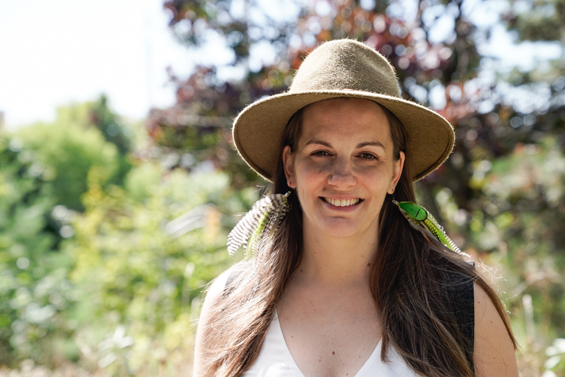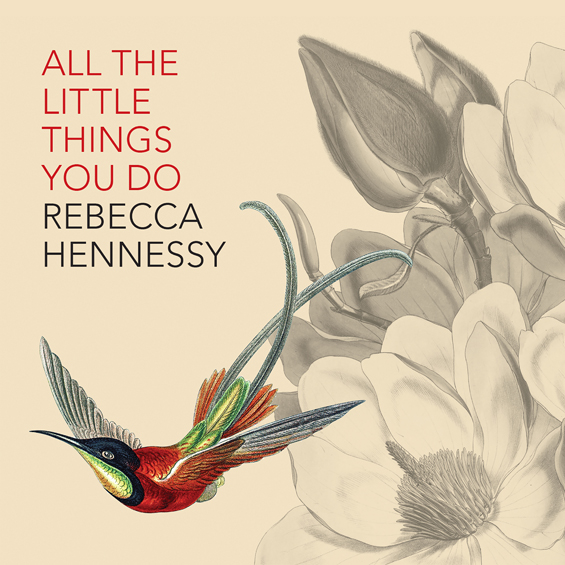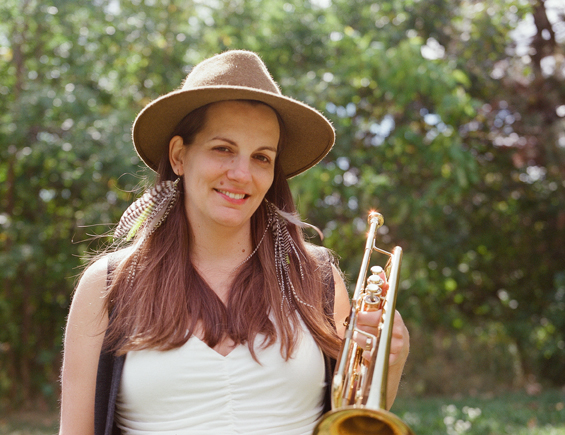

photo:
Karl Leung
TEN QUESTIONS WITH REBECCA HENNESSY
These are momentous days for Rebecca Hennessy. Not only has the Toronto-based trumpeter just released a new album, All The Little Things You Do (reviewed here), she's also awaiting the birth of her first child. That detail perhaps helps explain why the overall tone of the release, recorded after the early 2019 death of her mother, is so life-affirming. It's telling, for example, that the song that most directly deals with her passing does so in a way that's more celebratory than despairing. The most significant thing about the release, however, has to do with style: in being Hennessy's first singer-songwriter collection, it signifies a dramatic departure from the other albums with which she's been involved. textura spoke with her about the project and other related matters a few weeks before the November 6th release date.
1. In a year that has been difficult in many ways for everyone, artists have been hit hard, given the shutdown of clubs and the cessation of live performances. How have you dealt with surviving this lockdown period, and has it affected your creative spirit?
Yes, as an artist, it has been difficult to digest that our live performance careers have vanished before our eyes during the COVID-19 pandemic. During this pandemic, I took the extra time at home to finish this album before the arrival of my first child! I was also able to do some home recording for other people's projects and do some writing for another digital album that will be released in the new year. So to answer your question, it hasn't really affected my creative spirit. I feel lucky that I've had projects to continue and finish during this time. They are a life saver.
2. As the album's release follows the February 2019 death of your mother and anticipates the birth of your first child, it's understandable that there would be a powerful emotional dimension to the material. Did you find that these profound life changes amplified the the emotional charge of the songs as you wrote them?
I have definitely found these profound life changes added depth to my writing and vision of this album. I have found that writing and performing music to be very healing for me during difficult times throughout my life. It is also a lovely punctuation for celebratory times in my life as well.
3. Given those life experiences, it's also natural that the songs would encompass a spectrum of emotions, from grief to joy. Yet to these ears, while there is melancholy, the album feels largely joyful, uplifting and, if anything, full of love (see the rousing vocal chants in the title track, for instance, and “Dr. Good”). What would you say is the overall mood of the album?
I think that is wonderful that you're takeaway of this album is largely joyful, uplifting and full of love! I think you hit the nail on the head. I try to practice coming from a place of stillness and openness, especially when very troubling life changes have appeared in my life. I have found that even on the most awful of days or situations, we can also find beautiful moments. That is what my song “It's a Beautiful Day to Say Goodbye” touches on.
4. As I listen to the album, the impression forms that you gave a great deal of thought to track sequencing. The title track draws the listener in with its buoyant swing and hints of African highlife, for example, before the one-two punch of “Magnolia” and “Loving You” provides early evidence of how extraordinary the album is. How important was the ordering of the songs for you?
It is so lovely that you noticed the sequencing of the album. It was important for me to be thoughtful about how to best present this music in terms of order because I wanted to tell a story that made sense with the emotional shape of each composition. I was also considering the timeline that I wrote each piece and who I wrote each song with as well. With all of these elements to consider, I was worried that I'd have a more difficult time deciding on this order, but it somehow became wonderfully obvious once I started the process.

5. Some songs are moving, so much so that listening to them is almost overwhelming. All false modesty aside, did you find that after you'd written a song as magnificent as “Magnolia,” “Loving You,” “Eclipse,” or “When Stars Shine Bright” you came back to it later and were even yourself surprised or humbled by what you'd written?
Thank you very much for this incredible compliment and question. Wow. Well, I think the best way to answer this question is to say that some songs I write come easier to me and can leave me feeling quite light and happy, while others take more effort to figure out, almost like a puzzle. The songs that you mentioned in your question were a mix of both my experiences of writing, but I am happy with them and feel elated that other people like yourself enjoy listening to them.
6. Many song melodies have lodged themselves in my mind; “When stars shine bright, I think of you” and “I love you, I do, I do” are earworms that pop into my head every few minutes, it seems. How does a song come to you? Does it come as a whole or is it something you gradually shape with an instrument? And for these songs did you fashion the music and lyrics together or did one precede the other?
Often when I'm writing a song without a co-writer, lyrics, melody and harmony all kind of show up as a package while I'm at the piano. In the case of “Loving You” the lyrics were written before by Dave Clark. When he sent me the lyrics, I read them and began to hear some harmony and melody. I immediately sat at the piano and starting to find what I was hearing. The melody and chords came quite quickly and then the song was done. I was very happy with it and so was Dave. I started to write "When Stars Shine Bright” because I wanted to write a song that sounded like a Christmas carol. Once I started it, I asked my husband, co-songwriter, and bassist Michael Herring to help me finish it. I would work on it for a while, then he would edit or add something when I was stuck.
7. When I hear that an album's coming out where an instrumentalist's decided to add vocals, I brace myself for the worst, as often it turns out the artist's singing isn't at the same level as the playing. How delighted I was, then, to discover what a wonderful singer you are. It's one of the things that makes the album so special and emotionally affecting. Are there particular singers who you've drawn from for inspiration or been influenced by?
Thank you! I've been influenced by a lot of singers throughout my life, but in the last ten years, I've been really into Bonnie Raitt, Mavis Staples, Paul Simon, Lucinda Williams, Ron Sexsmith, Kevin Breit, and Joni Mitchell, to name a few. I don't know who I sound like, but I'm deeply moved by these artists and how they shape the songs that they sing.

photo: Karl Leung
8. In a similar vein, it's unusual for a musician established in the jazz field to create a singer-songwriter record, yet the result suggests that for you it was the most natural thing in the world. Was the shift from writing a jazz composition to a vocal-based song something you found easy to do?
I've been listening to singer-songwriters for as many years as I've been listening to jazz. Composing music that I like to listen to is something that I strive for and being able to write within different styles/genres has strengthened my creative output as an artist who strives to make good music.
9. While All The Little Things You Do is very much you, an occasional hint of influence suggests itself as I listen to it; I can't help but be reminded of Carole King's Tapestry when “Keep the Light Bright” plays, for instance. Were there specific artists or albums that influenced you during the writing and production stages?
Some of the singers I mentioned earlier definitely influenced the production stages of this album, but there was not specific aim to sound like a particular artist. I'm glad that Carole King comes up for you when you listen to “Keep the Light Bright”. That is a high compliment. I actually really wanted Mavis Staples to sing that song on on my album, but it didn't work out. Maybe I can get her on the next album.
10. Guitarist Kevin Breit, pianist Tania Gill, bassist Michael Herring, and drummer Dave Clark have been with you for a number of years. How integral were their contributions to the result? Breit's guitar playing and Drew Jurecka's strings, to cite one example, help make “Eclipse” one of the album's most powerful settings. The album also represents the first time you've collaborated with producer and engineer David Travers-Smith. How important was he to the final product?
Kevin, Tania, Michael, Dave, and I recorded most of these songs live off the floor, which is integral to the sound of this album. The report and trust we've developed as a band over the years really made the recording session flow well and very fun. Also, I co-wrote a bunch of these songs with Dave and Michael. Drew and Kevin's arrangements on some of the songs added more emotional impact and helped to add depth to the overall album. This was my first time working with David Travers-Smith, an incredible producer and engineer, and I feel so lucky to have worked with him on this project. His attuned creative input and overall aesthetic brought this album a level of lush expression that masterfully served each song and the overall shape of the album.
Website: REBECCA HENNESSY
November 2020![]()